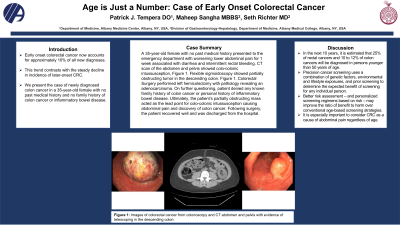Sunday Poster Session
Category: Colorectal Cancer Prevention
P0370 - Age Is Just a Number: A Case of Early Onset Colorectal Cancer
Sunday, October 22, 2023
3:30 PM - 7:00 PM PT
Location: Exhibit Hall

Has Audio

Patrick Tempera, DO
Albany Medical Center
Albany, NY
Presenting Author(s)
Patrick Tempera, DO, Maheep Sangha, MBBS, Seth Richter, MD
Albany Medical Center, Albany, NY
Introduction: An increase in cases of early-onset colorectal cancer (CRC), defined as diagnosis in patients younger than 50 years of age, has occurred in the United States. Early onset colorectal cancer now accounts for approximately 10% of all new diagnoses. This trend contrasts with the steady decline in incidence of later-onset CRC. We present the case of newly diagnosed colon cancer in a 35-year-old female with no past medical history and no family history of colon cancer or inflammatory bowel disease.
Case Description/Methods: A 35-year-old female with no past medical history presented to the emergency department with worsening lower abdominal pain for 1 week associated with diarrhea and intermittent rectal bleeding. CT scan of the abdomen and pelvis showed colo-colonic intussusception, Figure 1. Flexible sigmoidoscopy showed partially obstructing tumor in the descending colon. Figure 1. Colorectal Surgery performed left hemicolectomy with pathology revealing an adenocarcinoma. On further questioning, patient denied any known family history of colon cancer or personal history of inflammatory bowel disease. Ultimately, the patient’s partially obstructing mass acted as the lead point for colo-colonic intussusception causing abdominal pain and discovery of colon cancer. Following surgery, the patient recovered well and was discharged from the hospital.
Discussion: In the next 10 years, it is estimated that 25% of rectal cancers and 10 to 12% of colon cancers will be diagnosed in persons younger than 50 years of age. Because we lack evidence on the benefits and harms of initiating screening early than age 45, we should instead focus on improving how we define persons at higher risk. Precision cancer screening uses a combination of genetic factors, environmental and lifestyle exposures, and prior screening to determine the expected benefit of screening for any individual person. Better risk assessment – and personalized screening regimens based on risk – may improve the ratio of benefit to harm over conventional age-based screening strategies and may help curb the increasing incidence rates of CRC in the younger patient population. With this in mind, it is especially important to consider CRC as a cause of abdominal pain regardless of age.

Disclosures:
Patrick Tempera, DO, Maheep Sangha, MBBS, Seth Richter, MD. P0370 - Age Is Just a Number: A Case of Early Onset Colorectal Cancer, ACG 2023 Annual Scientific Meeting Abstracts. Vancouver, BC, Canada: American College of Gastroenterology.
Albany Medical Center, Albany, NY
Introduction: An increase in cases of early-onset colorectal cancer (CRC), defined as diagnosis in patients younger than 50 years of age, has occurred in the United States. Early onset colorectal cancer now accounts for approximately 10% of all new diagnoses. This trend contrasts with the steady decline in incidence of later-onset CRC. We present the case of newly diagnosed colon cancer in a 35-year-old female with no past medical history and no family history of colon cancer or inflammatory bowel disease.
Case Description/Methods: A 35-year-old female with no past medical history presented to the emergency department with worsening lower abdominal pain for 1 week associated with diarrhea and intermittent rectal bleeding. CT scan of the abdomen and pelvis showed colo-colonic intussusception, Figure 1. Flexible sigmoidoscopy showed partially obstructing tumor in the descending colon. Figure 1. Colorectal Surgery performed left hemicolectomy with pathology revealing an adenocarcinoma. On further questioning, patient denied any known family history of colon cancer or personal history of inflammatory bowel disease. Ultimately, the patient’s partially obstructing mass acted as the lead point for colo-colonic intussusception causing abdominal pain and discovery of colon cancer. Following surgery, the patient recovered well and was discharged from the hospital.
Discussion: In the next 10 years, it is estimated that 25% of rectal cancers and 10 to 12% of colon cancers will be diagnosed in persons younger than 50 years of age. Because we lack evidence on the benefits and harms of initiating screening early than age 45, we should instead focus on improving how we define persons at higher risk. Precision cancer screening uses a combination of genetic factors, environmental and lifestyle exposures, and prior screening to determine the expected benefit of screening for any individual person. Better risk assessment – and personalized screening regimens based on risk – may improve the ratio of benefit to harm over conventional age-based screening strategies and may help curb the increasing incidence rates of CRC in the younger patient population. With this in mind, it is especially important to consider CRC as a cause of abdominal pain regardless of age.

Figure: Images of colorectal cancer from conolonscopy and CT abdomen and pelvis with evidence of telescoping in the descending colon.
Disclosures:
Patrick Tempera indicated no relevant financial relationships.
Maheep Sangha indicated no relevant financial relationships.
Seth Richter indicated no relevant financial relationships.
Patrick Tempera, DO, Maheep Sangha, MBBS, Seth Richter, MD. P0370 - Age Is Just a Number: A Case of Early Onset Colorectal Cancer, ACG 2023 Annual Scientific Meeting Abstracts. Vancouver, BC, Canada: American College of Gastroenterology.
